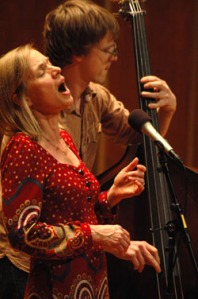Pushing Boundaries
“As far as boundaries are concerned, we are always looking for new ones.” *
A little while back I attended a class by Hankus Netsky who heads up our Contemporary Improvisation Department. This is the department Gunther Schuller created in 1973 as “Third Stream” with the amazing Ran Blake as its first chair. I had attended quite a few performances by the department and been swept up in the energy and creativity of the students and faculty alike, but I had never had the opportunity to experience the actual teaching of improvisation.
Actually, I find the term “improvisation” much too confining. The Department is more about discovering the huge wellspring of imagination in a student and then allowing it to cascade in whatever direction is possible – ethnic, blues, electro-acoustic, avant-garde, Appalachian, Scottish fiddle, Klezmer et al. So let’s just call it teaching, and very inspired teaching at that.

The group of students numbered about 10 and it was very apparent that they all felt great respect and affection for each other. Hankus, who was bustling with energy, played a recording and then got the group to sing a Calypso by, of all people, Sonny Rollins, with the express wish that whatever and however they sing, they will then play similarly on their instruments.

When the Calypso felt comfortable for the group, individuals started to sing improvisations within the structure of the piece. Then, it was time to move from vocals to instruments, but with the sure understanding that it is our vocal selves that shape and form our instrumental selves. The results were free-wheeling, inspiring, original, and curiously moving. Hankus filled all the empty spaces with questions and encouragement. He wasn’t just getting the best out of these players; he was stretching them by taking them to new places, not yet discovered, but certainly dreamt of. This was teaching at the highest level.

Dominique Eade, one of this country’s great singers and another of our CI faculty members, talks about music and what is really on the page when she works with our students. We are given so little and it is always changing and we are always changing it, she stresses. “All music is improvisation at some level.” Having heard Dominique perform some of her own songs, as well as standards, in wonderfully reconfigured arrangements with the chamber orchestra A Far Cry, I can tell you she personifies the overarching ethos of the department.
On February 22, I attended a concert in Jordan Hall produced by Tanya Kalmanovitch, Assistant Chair of the CI Department, called This is Our Music. It was a marathon lasting nearly 3 hours and yet seeming to take no time at all because it was just so absorbing. When this huge concert, which showcased nearly every student in the department, concluded, everyone repaired to Williams Hall for a reception, and guess what? – there was more music, performed with the same intensity and joy. The concert itself featured, exclusively, works written and performed by the students. These ranged from bassoonist Joelle Wagner’s Mautis Religiosa which immediately became one of my favorites. It is inspired by children’s writer and illustrator Edward Gorey whose ideas sound like Roald Dahl having a nightmare. And that was pretty much what the piece was about, stunningly sung and acted by Alex Overbeck. Then there was Mia Friedman’s lyrical 18 Mornings and Peter Negroponte’s Special Olympics during which he played both percussion and guitar. The latter was a work that took no prisoners! The Sail Away Ladies –an Honors Ensemble from last year–celebrated something of a reunion with three numbers: Ariel Friedman’s From Silence, beautifully arranged, pulsing with energy and the physicality of performance, Run Away by Sarah Jarosz, and Eden MacAdam-Somer’s 14 Miles.
I watched Hankus, who was seated to my right, experience all these works; he was living every moment as if he were the greatest Red Sox fan at a winning game. Perhaps the mostmoving and in some ways original work of the evening was Goodbye Ben Ali by Yasmine Azalez for string quartet and electronics. (click here to listen to the song now.)
This work was a response to the “Jasmine Revolution” that occurred in Azaiez’s home country of Tunisia and she evoked all the violence and pain as well as the breath of hope and liberation.
In While You Slept I Lingered, sax player Andy Allen wrote music that came out of deconstructed noise and then became theatrical, and rhythmically inventive.
The biggest piece was Not Alone by David Schockett who sang from the piano supported by a small chamber orchestra of C.I. students. (click here to listen to the song now.)
Simon Hanes in Ibidem wrote a moving spatial work that used all corners of Jordan Hall. Leah Hennessy in After Blue sang with strength and beauty incorporating silence as an integral part of the structure.
In the finale, Nedelka Prescod sang The Path, supported by Leah Hennessy and Ryan Stickney, in a performance radiant with spiritual longing. (click here to listen to the song now.)
I have left out many other great pieces and performances, but I wanted to give you a sense of how these young artists and inspired faculty are really taking music in a new direction–one that should give us great optimism for the future of our art form. I had the best time.
*Hankus Netsky
![]()

Leave a Comment: